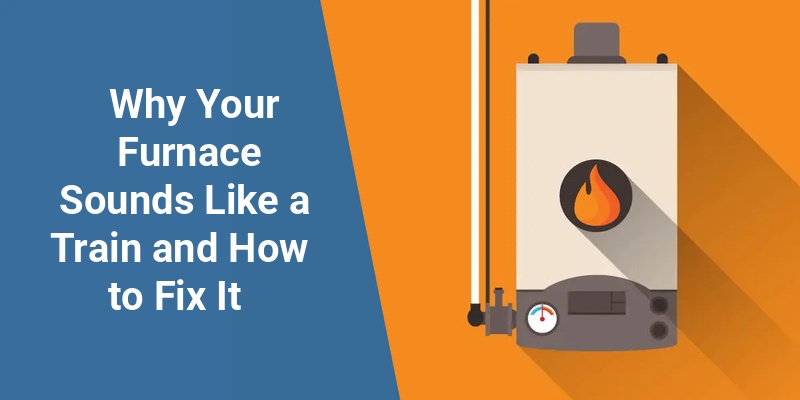A furnace that sounds like a train can be both distracting and concerning. This unusual noise often signals underlying mechanical issues that affect your heating system’s performance and longevity. The clanking, banging, or chugging sounds reminiscent of a locomotive can stem from several common causes, ranging from delayed ignition to loose components. Understanding the reasons behind these noises and knowing how to address them can save homeowners time, money, and stress during colder months.
| Common Causes | Typical Sounds | Recommended Action |
|---|---|---|
| Delayed Ignition | Bang or boom at startup | Professional inspection and cleaning |
| Loose or Damaged Blower Parts | Rattling or clanking noise | Tighten or replace parts |
| Expanding and Contracting Ductwork | Popping or banging sounds | Insulate or secure ducts |
| Dirty or Clogged Air Filter | Whooshing or whistling | Change filter regularly |
Common Causes of Furnace Noises That Resemble a Train
Furnace noises like a train frequently indicate several mechanical issues that require timely attention. The following causes explain why these sounds occur:
Delayed Ignition or Gas Ignition Delay
When gas builds up before ignition, it can cause a loud banging or booming noise similar to a train’s chug. This is known as delayed ignition and can strain furnace components, reducing efficiency.
Loose or Broken Blower Components
The blower motor contains parts that can loosen or wear over time. The result is a rattling or clanking noise during operation, which echoes like train wheels on tracks. Inspecting and securing these parts is critical.
Expanding and Contracting Ductwork
Metal ducts expand when heated and contract when cooled, sometimes creating popping or banging sounds. While these noises can resemble a train’s rhythm, they indicate that ductwork is shifting or not adequately secured.
Dirty or Clogged Air Filters
A dirty air filter can restrict airflow and cause the furnace to work harder, sometimes producing a whooshing or whistling noise that might resemble the rails of a train in motion.
How To Diagnose Furnace Noises Like a Train
Diagnosing the exact cause of furnace noise involves observation and basic troubleshooting steps. Homeowners should:
Call 888-906-9139 for Free Local HVAC Quotes – No Obligation, Just Savings!
- Listen carefully to when the noise occurs (startup, shutdown, continuously).
- Note the type of sounds: banging, rattling, popping, whistling.
- Check and replace the air filter if it looks dirty or clogged.
- Inspect visible ductwork for loose panels or fasteners.
- Observe if any parts in the blower assembly appear loose or damaged.
If noises persist or sound severe, a professional HVAC technician should be called to perform a comprehensive inspection.
Fixes and Solutions for Train-Like Furnace Sounds
Several effective solutions can resolve furnace noises mimicking train sounds, improving system function and household comfort.
Professional Cleaning and Inspection
Delays in ignition usually result from dirt and grime buildup. A thorough professional cleaning of burners and ignition components can restore safe ignition timing, eliminating the bang.
Tightening and Repairing Blower Components
Technicians can tighten loose screws, replace worn blower belts, or repair motor mounts to stop rattling sounds that resemble train clanks.
Securing and Insulating Ductwork
Adding insulation and securing ducts with screws or brackets reduces metal movement, cutting down popping and banging noises associated with train-like furnace sounds.
Regular Air Filter Maintenance
Changing filters every 1-3 months prevents airflow restrictions that may cause irregular furnace sounds. Keeping filters clean is a simple yet critical step.
When to Call a Professional HVAC Technician
While some furnace noises can be managed with simple homeowner checks, persistent or severe train-like sounds indicate serious issues requiring expert help. Situations warranting professional service include:
Call 888-906-9139 for Free Local HVAC Quotes – No Obligation, Just Savings!
- Repeated loud bangs at furnace startup
- Rattling noises that persist despite tightening visible parts
- Signs of gas leaks or burning odors
- Inefficient heating or frequent system shutdowns
Professional technicians use diagnostic tools and advanced knowledge to ensure safe and effective repairs.
Preventative Steps to Avoid Furnace Train Noises
Implementing regular maintenance routines prevents furnace noise issues and extends system lifespan. Recommended steps:
- Schedule annual furnace tune-ups and inspections
- Replace air filters on schedule to promote airflow
- Keep the furnace area clean and free of debris
- Promptly address minor noises before they escalate
By maintaining your furnace properly, train-like noises can be minimized or avoided altogether.
